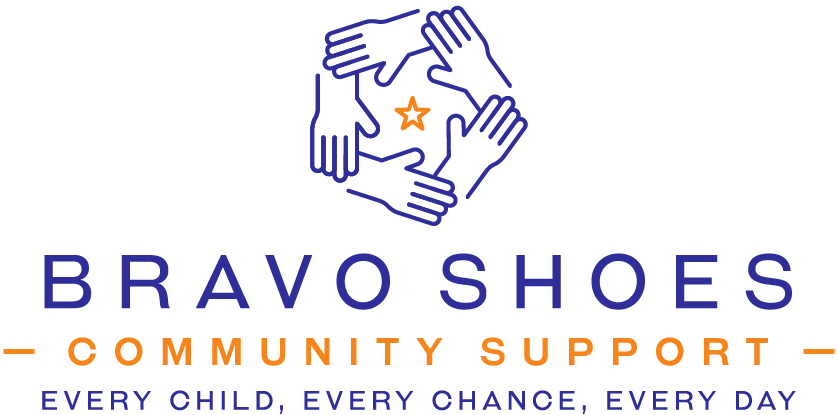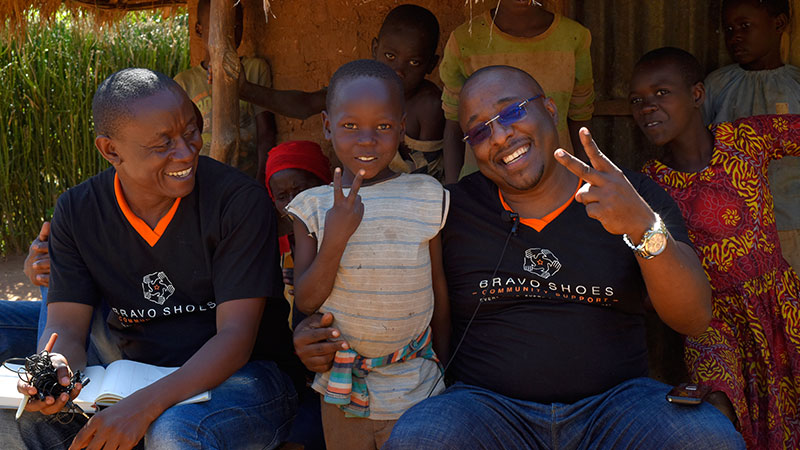Following up on the news of the 6-year-old gathering empty plastic bottles for survival on NTV news, Bravo Shoes Community Support Organisation had to step in to save the future of Shakur Amiyat.
As the wave of development descends to the east, there is a spirited boy with the heart of a lion ready to defy the odds that come with development and civilisation as it is in developing countries.
The 6-year- old Shakur despite the fact he, is a happy boy with tones of hope as evidence of his resilience. An interesting chap, whenever we could ask him anything, he could just smile back and you read between the lines of his smile.
He speaks Ateso with little or nothing in English, he lives with his 45-year-old sick grandmother, Asiyo Christine and his one uncle and an aunt who are in the same age bracket in Dwalata, Kiuomi Village, Pallisa Town Council in Pallisa District.
Asked by Yesigye Brian Bravo the Executive Director of Bravo Shoes Community Support Organisation if he would want to go back to school, Shakur responded in the affirmative that maybe he has been scotched enough by the relentless sun.
“Shakur 6yrs old is a happy and interesting chap, whenever we could ask him anything, he could just smile because of the Language Barrier. He speaks Atesot and Uncle Bravo does know Atesot. When we asked him if he wants to go to school,” Bravo said.
Shakur is driven by the spirit of leadership and responsibility and without any permission, the young boy treks between 2km to 3km to look for plastic bottles.

He would also devise other means to raise more money by sorting rice on another journey of 5km away from home, he would later take home to take care of his grandmother who stays at home.
According to Okwaja Joseph innocent, the waiter at Pallisa Gardens in Pallisa Town Council, it has been 2 years since Shakur started coming to their premises to collect plastic bottles- this means Okwaja started recognising Shakur’s presence when he was just 4 years old.
“It is 2 years since he started coming here collecting empty bottles, during school times, he comes in the afternoon. When there is no school, he comes as early as 8:00 am, he picks and takes them to get money and get something to eat. We keep them for him even if he doesn’t show up that day,” he explained.
A small distance away from his home, there is a school, West View Primary School and according to Ronald Ssemakula the director of the school which says is home to over 300 learners, not many parents in Pallisa see anything in taking children to school.
“The problem lies with the society and its background, many parents here did not go to school and many children don’t go to school, most of them are looking for money,” he said.
His grandmother Asiyo told Bravo team that the boy keeps skipping s hool without her consent to go and loom around looking for money.
“He is a student at Odwalata Primary School in primary one, sometimes he dodges school to go and collect plastic bottles and before you know it, he comes back home with food. I started falling sick during Covid and when he sees me sick, he feels bad and instead of going to school, he would concentrate on taking care of me,” he said
Asiyo said that her grandson was abandoned to her by her daughter after giving birth and she has single-headedly raised the boy despite her mother Beatrice Tino being unavailable.
“She was 20 when she gave birth to Shakur while in Primary 7, she gave birth and dropped him here. I think she got married in Jinja.,” he said.
Our effort to reach Tino was futile despite various attempts to call her on her known contacts as shared by her mother who is also grappling with debts which remain unclear, the remaining portion of her land will be gone.
It is explained that Asiyo got a loan of Sh1.8 million to do business but with her illness, the money never achieved its purpose and it could be taken.

Aaron Kabona Jamal the activist and youth leader in Pallisa claims to make Shakur’s video go viral on social media and said that many young children are into informal employment something contrary to the laws of Uganda.
“They are 3 children in this family all involved in this activity and buy food at the end of the day, I found Shakur picking bottles a long time ago and I took a video which went viral,” he said.
Ugandan legislation prohibits the employment of children under the age of 12. National labour law prohibits the involvement of children 12-13 in any employment except for light work carried out under the supervision of an adult.
As population pressures mount, sadly the number of toddlers like Shakur also shoots. The 2002 national census estimated the population of the district at 255,900 but it has since continued to sour and in 2012, the population of Pallisa District was estimated at over 426,000 yet few opportunities emerged.
According to Okirakol Aggrey Paul, the Senior Community Development Officer, the district has alarming cases of child labour and many are looming on the streets as hawkers and basically working in 3 areas.
“They are on streets doing hawking things like eggplants, bananas, onions and others are hired rice plantations to scare away birds, others are in sand quarries among others,” he said.
Okirakol said that as Town Council, they are engaging with different stakeholders like the local councils, Community-Based Organisations (CBOs) and Non-Government Organisations (NGOs) to address the situation.
“We have engaged communities and we have received more reports and we have since rescued many from trafficking,” he said.
Child labour is defined under the Children (Amendment) Act of 2016 as “work that is mentally, socially or morally dangerous and harmful to a child and the circumstances under which it is performed jeopardizes the health, safety, morals and education of a child”. The minimum age for employment is set as 16 years.
According to the Uganda National Household Survey (2016/17) by the Uganda Bureau of Statistics, over two million children are engaged in some form of child labour.
Such a statistic indicates that Uganda is at risk of losing a future productive workforce. It is therefore important to note that child labour, job creation and labour productivity are strongly linked.
According to the ILO, child labour is work that is mentally or morally dangerous and harmful to children; it interferes with their schooling by depriving them of the opportunity to go to school, forcing them to leave school early, and forcing them to try to combine school attendance with excessively long and heavy, often dangerous work


